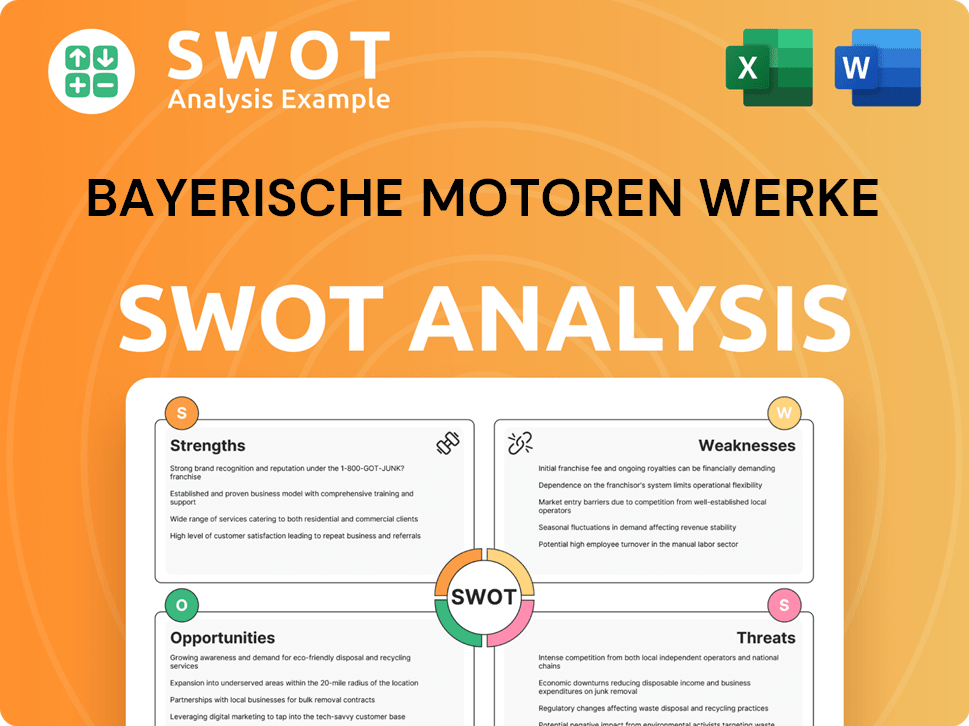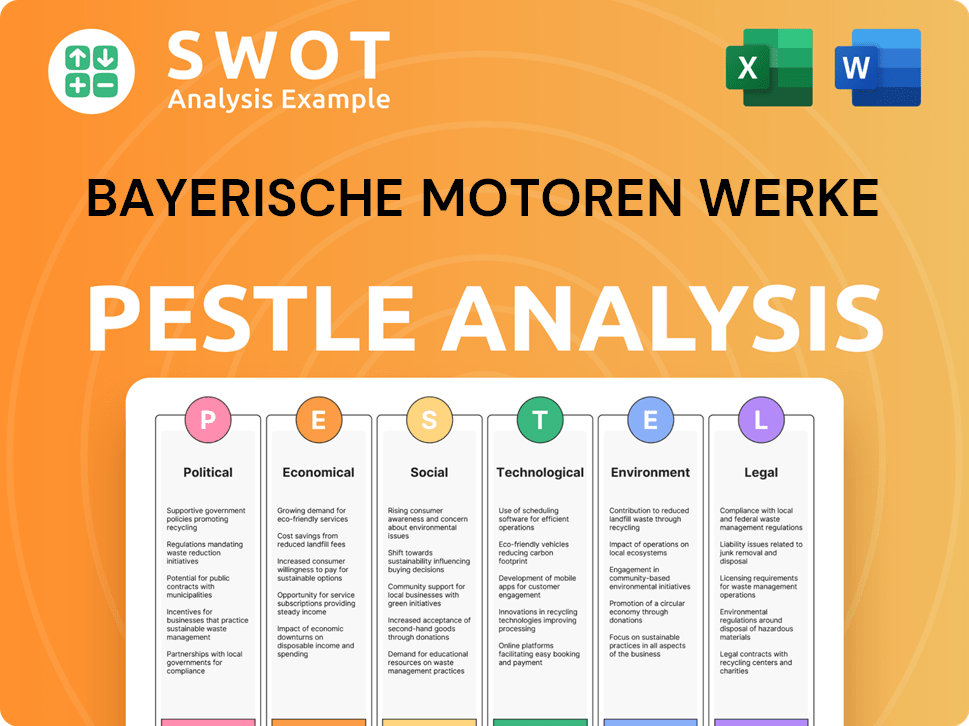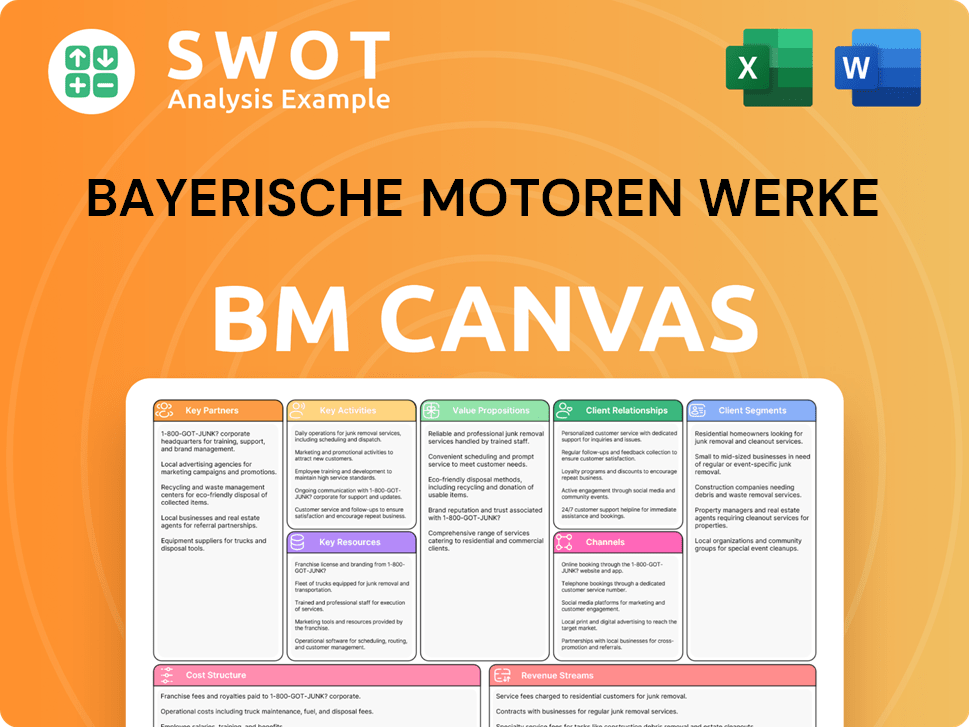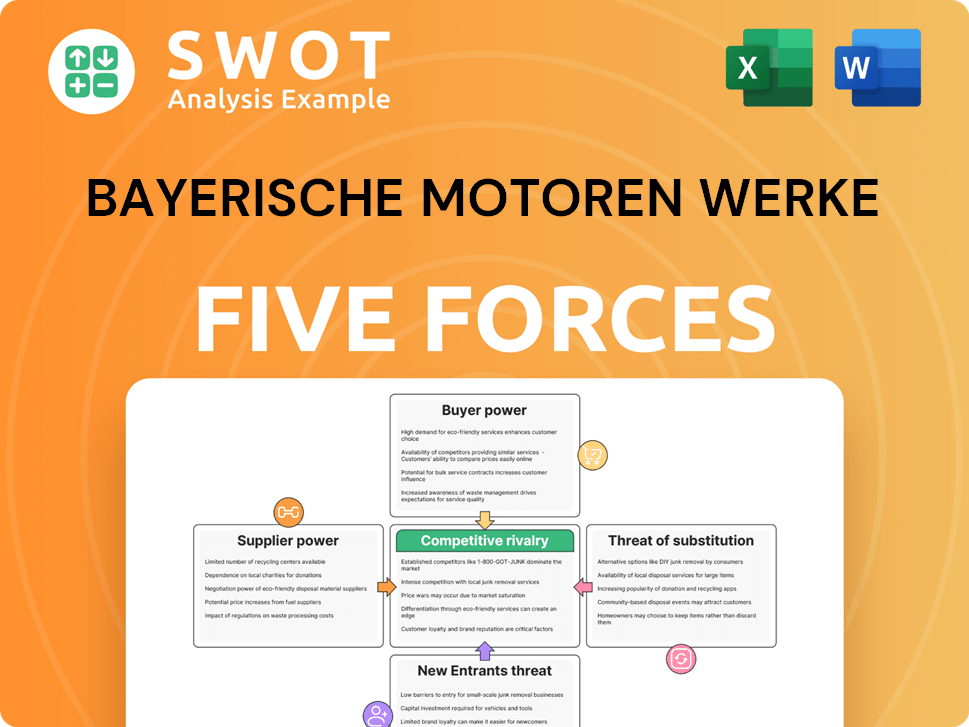Bayerische Motoren Werke Bundle
Can BMW Maintain Its Dominance in the Shifting Automotive Arena?
The automotive industry is in a state of constant flux, driven by electric vehicles, autonomous driving, and sustainability. BMW, a titan of luxury and innovation since 1916, stands at the forefront of this transformation. This article dives deep into the competitive landscape surrounding Bayerische Motoren Werke, offering a comprehensive analysis of its position in this dynamic market.

From its origins as an aircraft engine manufacturer to its current status as a global leader, BMW's journey is a testament to its engineering prowess. Understanding the Bayerische Motoren Werke SWOT Analysis is crucial for any investor or strategist. This exploration will dissect BMW's competitive advantages, identify its key rivals, and analyze its position within the automotive industry. We'll examine BMW market analysis, its strengths and weaknesses, and the challenges it faces from its competitors in the luxury car segment and the electric vehicle competition, providing actionable insights for informed decision-making.
Where Does Bayerische Motoren Werke’ Stand in the Current Market?
The BMW Group holds a strong market position in the global automotive industry, particularly within the premium segment. In 2024, the company aimed to increase sales volumes in the automotive segment, building on its previous performance. BMW's core operations involve the design, manufacturing, and sale of premium automobiles, motorcycles, and related services.
The company's value proposition revolves around delivering high-performance, innovative, and design-focused vehicles under the BMW, MINI, and Rolls-Royce brands. This strategy allows BMW to command higher profit margins compared to volume manufacturers. BMW's financial health is demonstrated by a free cash flow of €1.6 billion in the Automotive segment in the first quarter of 2024.
BMW's market presence extends globally, with significant sales contributions from Europe, Asia (especially China), and the Americas. The company's focus on the premium and luxury segments has allowed it to maintain a strong brand image. BMW is actively working to strengthen its position in emerging markets and expand its electric vehicle offerings.
BMW's market share varies by region and vehicle category. In the first quarter of 2024, BMW Group reported a significant increase in sales of fully electric vehicles, with 82,700 units delivered, marking a 27.9% rise compared to the previous year. This demonstrates BMW's strategic shift and growing presence in the electric vehicle market.
The BMW Group reported a free cash flow in the Automotive segment of €1.6 billion in the first quarter of 2024. This indicates strong liquidity and operational efficiency. BMW's focus on premium vehicles allows for higher profit margins.
BMW has a strong presence in all major global markets. Significant sales contributions come from Europe, Asia (especially China), and the Americas. The company is strategically positioned to capitalize on growth in these regions.
BMW's primary product lines include premium automobiles under the BMW, MINI, and Rolls-Royce brands, as well as motorcycles under the BMW Motorrad brand. The company consistently focuses on the premium and luxury segments, maintaining its brand image of performance, innovation, and design.
BMW's market position is characterized by its strong presence in the premium segment, global sales, and commitment to innovation. The company's financial performance, including a free cash flow of €1.6 billion in Q1 2024, reflects its operational efficiency. BMW's strategic focus on electric vehicles and emerging markets positions it for future growth. For more insights, consider reading about Owners & Shareholders of Bayerische Motoren Werke.
- Dominant in the premium and luxury segments.
- Significant growth in electric vehicle sales.
- Strong global presence with key markets in Europe, Asia, and the Americas.
- Focus on innovation and design.
Bayerische Motoren Werke SWOT Analysis
- Complete SWOT Breakdown
- Fully Customizable
- Editable in Excel & Word
- Professional Formatting
- Investor-Ready Format

Who Are the Main Competitors Challenging Bayerische Motoren Werke?
The BMW competitive landscape is shaped by a dynamic interplay of established luxury brands, emerging electric vehicle (EV) manufacturers, and evolving market trends. The company faces a complex web of competitors in both the automotive and motorcycle sectors, each vying for market share and customer loyalty. Understanding these competitive dynamics is crucial for assessing BMW's market analysis and future prospects.
BMW's market share analysis reveals a constant battle for dominance in the premium automotive sector. The company must continually adapt its strategies to maintain its position against rivals that are also innovating in areas such as electric vehicles, autonomous driving, and digital services. The competitive environment is not static; it is influenced by technological advancements, changing consumer preferences, and global economic conditions.
BMW's main rivals include a mix of direct competitors in the premium automotive segment and indirect competitors offering alternatives in the broader automotive market. The competitive landscape also includes new entrants and evolving business models, which further complicate the competitive environment. To gain a deeper understanding of the company, you can start with a Brief History of Bayerische Motoren Werke.
BMW's primary competitors in the premium automotive segment include Mercedes-Benz, Audi, and Tesla. These brands compete directly with BMW across various vehicle classes, including sedans, SUVs, and performance models. The competition is fierce, with each brand striving to offer superior technology, luxury, and performance.
Mercedes-Benz is a key competitor, known for its luxury and comfort. It challenges BMW across a wide range of models. In 2024, Mercedes-Benz global sales reached approximately 2.04 million vehicles, demonstrating its strong market presence.
Audi, part of the Volkswagen Group, competes with BMW, particularly in the executive and luxury car segments. Audi's advanced technology and quattro all-wheel-drive systems are key differentiators. Audi's global deliveries in 2024 were around 1.89 million vehicles.
Tesla is a significant competitor, especially in the EV market. Its leadership in EV technology and strong brand appeal pose a growing threat. Tesla's global deliveries in 2024 were approximately 1.81 million vehicles.
BMW also faces indirect competition from high-volume manufacturers and new entrants. These competitors are expanding into premium offerings and targeting specific niches. The rise of Chinese automotive manufacturers is another emerging competitive force.
Some mainstream brands are developing more luxurious sub-brands or highly equipped models, attracting customers who might consider BMW. This shift increases competition in the premium segment. For example, brands like Toyota and Hyundai are expanding their luxury offerings.
The automotive industry is shaped by strategic alliances and mergers, impacting the competitive landscape. Collaborations in autonomous driving and EV platforms are common.
- Charging Infrastructure: Partnerships among traditional automakers on charging infrastructure affect competitive dynamics. For example, collaborations to expand the availability of EV charging stations.
- Battery Technology: Joint ventures in battery technology influence the competitive landscape. This includes partnerships to develop and manufacture batteries for electric vehicles.
- Autonomous Driving: Alliances to share development costs for autonomous driving technologies. These collaborations aim to accelerate innovation and reduce individual costs.
- Electric Vehicle Platforms: Cooperation in developing EV platforms to streamline production and reduce costs. This includes sharing platforms to create a wider range of EV models.
Bayerische Motoren Werke PESTLE Analysis
- Covers All 6 PESTLE Categories
- No Research Needed – Save Hours of Work
- Built by Experts, Trusted by Consultants
- Instant Download, Ready to Use
- 100% Editable, Fully Customizable

What Gives Bayerische Motoren Werke a Competitive Edge Over Its Rivals?
Bayerische Motoren Werke (BMW) has established a strong competitive position in the automotive industry, primarily through its engineering prowess, brand recognition, and dedication to driving dynamics. The company's focus on producing high-performance vehicles with advanced technology has cultivated a loyal customer base. This loyalty translates into strong resale values and repeat purchases, solidifying BMW's market presence.
BMW's competitive advantages are also rooted in its global production network and extensive distribution channels. These elements enable the company to efficiently manufacture and deliver vehicles worldwide, supporting its position in the premium automotive segment. Furthermore, BMW's continuous investment in research and development ensures it stays at the forefront of innovation, particularly in areas like electrification and autonomous driving. For an in-depth look at their strategic growth, consider reading about the Growth Strategy of Bayerische Motoren Werke.
In recent years, BMW has faced increasing competition from both established and emerging players in the automotive market. Competitors are investing heavily in electric vehicles and autonomous driving technologies, putting pressure on BMW to innovate and adapt. Despite these challenges, BMW's brand reputation and commitment to quality remain significant assets, allowing it to maintain a competitive edge.
BMW's reputation is built on its engineering capabilities, particularly in engine development, chassis tuning, and vehicle dynamics. The company's proprietary technologies set its vehicles apart, offering a distinctive driving experience. This focus on performance and precision has been a cornerstone of BMW's brand identity for decades.
BMW benefits from a strong brand reputation and high customer loyalty. The brand's association with luxury, performance, and innovation contributes to its appeal. This brand equity translates into strong resale values and repeat purchases, supporting BMW's financial performance.
BMW's global production network and extensive distribution channels ensure widespread availability of its vehicles. This allows the company to efficiently manufacture and deliver vehicles worldwide. The robust supply chain and after-sales support further enhance customer satisfaction.
BMW is a pioneer in integrating digital services and connectivity features into its vehicles. The company continually invests in research and development to maintain its technological edge. This focus on innovation helps BMW adapt to evolving industry trends, such as electrification and autonomous driving.
BMW's strengths include its engineering excellence, strong brand equity, and global presence. The company's focus on driving dynamics and technological innovation has cultivated a loyal customer base. BMW's market position is bolstered by its premium brand image and its ability to command high prices.
- Market Share: In 2024, BMW maintained a significant share of the global premium car market, with sales figures consistently high compared to competitors.
- Financial Performance: BMW's financial results in 2024 reflect its strong brand and efficient operations, with robust revenue and profitability figures.
- Innovation: BMW continues to invest heavily in electric vehicles (EVs) and autonomous driving technologies, aiming to maintain its competitive edge in these growing segments.
- Customer Satisfaction: BMW consistently scores high in customer satisfaction surveys, reflecting the quality and appeal of its vehicles and services.
Bayerische Motoren Werke Business Model Canvas
- Complete 9-Block Business Model Canvas
- Effortlessly Communicate Your Business Strategy
- Investor-Ready BMC Format
- 100% Editable and Customizable
- Clear and Structured Layout

What Industry Trends Are Reshaping Bayerische Motoren Werke’s Competitive Landscape?
The automotive industry is undergoing a significant transformation, and this is reshaping the BMW competitive landscape. The shift towards electric vehicles (EVs), advancements in autonomous driving, and evolving consumer preferences are key trends influencing the company. BMW's market analysis must consider these factors to maintain its position in the luxury car segment.
BMW faces both challenges and opportunities in this dynamic environment. Economic shifts, geopolitical tensions, and supply chain issues add complexity. However, the growth of emerging markets and innovations in technology create new avenues for expansion. This article will explore the industry trends, future challenges, and opportunities for Bayerische Motoren Werke, providing insights into its competitive position.
The automotive industry is experiencing rapid changes, with electrification being a primary driver. Consumer demand for connected services and subscription-based features is increasing. Autonomous driving technologies are also advancing, creating new possibilities for mobility services. These trends are reshaping the competitive dynamics of the automotive industry.
BMW faces several challenges, including scaling EV production and ensuring its EVs are competitive. Economic uncertainty, geopolitical tensions, and supply chain disruptions pose risks. Developing advanced technologies such as autonomous driving also requires substantial investment. These challenges require strategic responses.
Emerging markets offer significant growth potential for BMW. Innovations in battery technology and charging solutions can improve EV performance and reduce costs. New mobility services, such as ride-sharing, create new revenue streams. Strategic partnerships can also help BMW navigate the challenges.
BMW's strategy focuses on electrification, digitalization, and circular economy principles. The company aims for EVs to account for over 50% of global sales before 2030. Investments in software development and digital integration are also crucial. This approach aims to ensure BMW's resilience and competitiveness.
BMW is actively pursuing several strategic initiatives to address industry trends and challenges. These include expanding its EV portfolio, investing in autonomous driving technologies, and enhancing digital services. These efforts are critical for maintaining a competitive edge in the evolving automotive market. For more details, see Revenue Streams & Business Model of Bayerische Motoren Werke.
- Expanding EV Offerings: Increasing the range and number of electric vehicle models to meet growing consumer demand.
- Digitalization: Developing advanced software and connected services to enhance the driving experience.
- Partnerships: Collaborating with technology companies to accelerate innovation in autonomous driving and other areas.
- Sustainability: Implementing circular economy principles to reduce environmental impact.
Bayerische Motoren Werke Porter's Five Forces Analysis
- Covers All 5 Competitive Forces in Detail
- Structured for Consultants, Students, and Founders
- 100% Editable in Microsoft Word & Excel
- Instant Digital Download – Use Immediately
- Compatible with Mac & PC – Fully Unlocked

Related Blogs
- What are Mission Vision & Core Values of Bayerische Motoren Werke Company?
- What is Growth Strategy and Future Prospects of Bayerische Motoren Werke Company?
- How Does Bayerische Motoren Werke Company Work?
- What is Sales and Marketing Strategy of Bayerische Motoren Werke Company?
- What is Brief History of Bayerische Motoren Werke Company?
- Who Owns Bayerische Motoren Werke Company?
- What is Customer Demographics and Target Market of Bayerische Motoren Werke Company?
Disclaimer
All information, articles, and product details provided on this website are for general informational and educational purposes only. We do not claim any ownership over, nor do we intend to infringe upon, any trademarks, copyrights, logos, brand names, or other intellectual property mentioned or depicted on this site. Such intellectual property remains the property of its respective owners, and any references here are made solely for identification or informational purposes, without implying any affiliation, endorsement, or partnership.
We make no representations or warranties, express or implied, regarding the accuracy, completeness, or suitability of any content or products presented. Nothing on this website should be construed as legal, tax, investment, financial, medical, or other professional advice. In addition, no part of this site—including articles or product references—constitutes a solicitation, recommendation, endorsement, advertisement, or offer to buy or sell any securities, franchises, or other financial instruments, particularly in jurisdictions where such activity would be unlawful.
All content is of a general nature and may not address the specific circumstances of any individual or entity. It is not a substitute for professional advice or services. Any actions you take based on the information provided here are strictly at your own risk. You accept full responsibility for any decisions or outcomes arising from your use of this website and agree to release us from any liability in connection with your use of, or reliance upon, the content or products found herein.